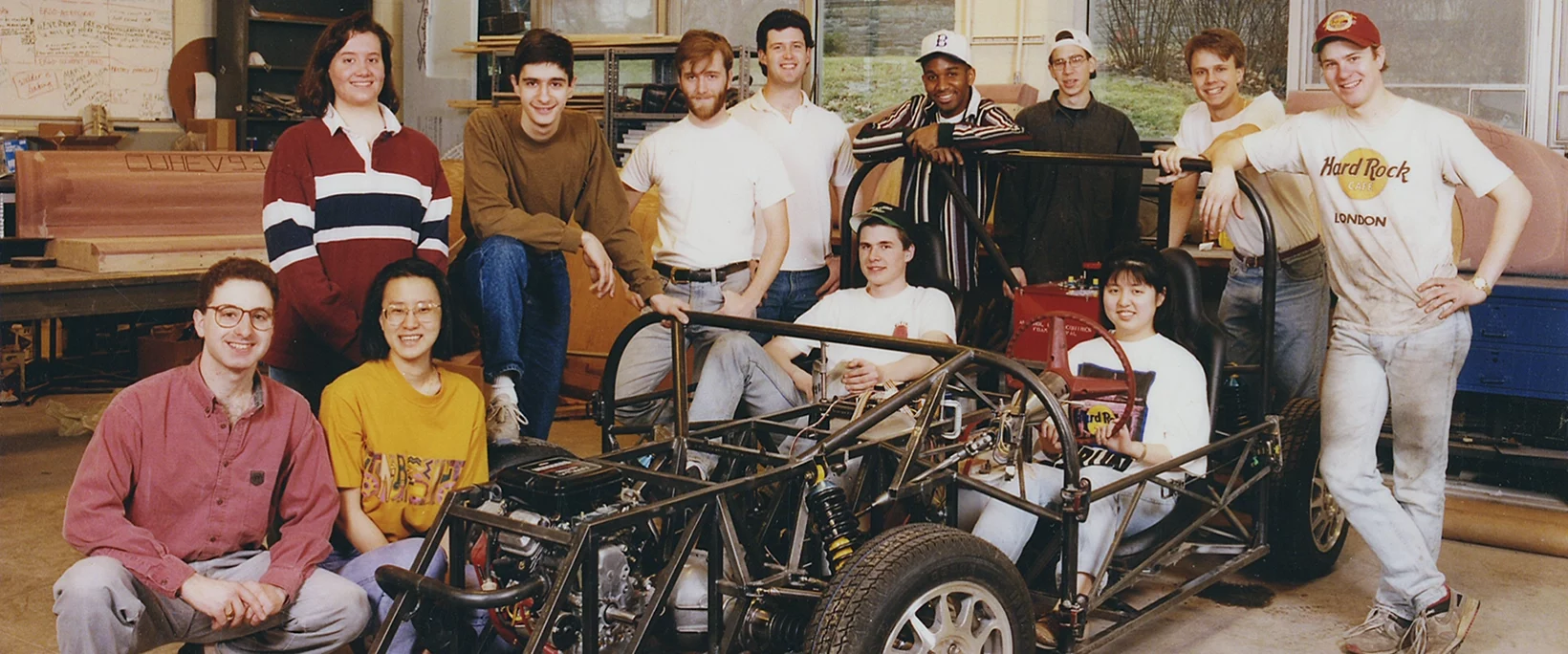
AVTC’s History
CONCEPTUALIZING AVTCs
The origins of the Advanced Vehicle Technology Competitions (AVTCs) trace back to the mid-1980s, when the U.S. Department of Energy (DOE) was exploring new ways to spark innovation in transportation. In 1986, Al Streb, then Deputy Assistant Secretary for Energy Efficiency and Renewable Energy (EERE), challenged his team to propose bold ideas for a workshop on competitiveness and trade. The call was simple: bring forward an idea that could inspire progress, and DOE would provide the support to make it happen.
Phil Patterson, a data analyst with DOE’s Vehicle Technologies Program (VTP), saw an opportunity. What if university students—North America’s next generation of engineers—were given the chance to design and build advanced vehicles? Patterson envisioned a program that would combine hands-on engineering with real-world competition, pushing students to develop energy-efficient vehicles. To make it compelling, he proposed teaming up with the Society of Automotive Engineers (SAE) and offering prize money to the most innovative university teams.
Recognizing its potential to both advance technology and cultivate future talent, DOE funded Patterson’s proposal. He then partnered with Bob Larsen at Argonne National Laboratory (ANL) to refine the program and bring it to life. With support from DOE, ANL, and SAE, the very first AVTC was launched in 1988: the Methanol Marathon.
That competition not only showcased what student teams could accomplish but also planted the seed for what would become a decades-long tradition of innovation, collaboration, and workforce development—one that continues to shape the future of mobility to this day.
EXPLORE THE AVTC HISTORY
2025
Evaluating CAVs in EcoCAR
EcoCAR EV Challenge teams are pushing the limits of Connected and Automated Vehicle (CAV) technology. From adaptive cruise control to intersection navigation, students integrate and test these features in Cadillac LYRIQs using cutting-edge tools from Argonne National Laboratory.
2023
Battery Workforce Challenge Begins
The Battery Workforce Challenge collegiate competition is a three-year engineering competition that challenges North American universities and their community college partners to design, build, test and integrate an advanced EV battery pack into a Stellantis vehicle.
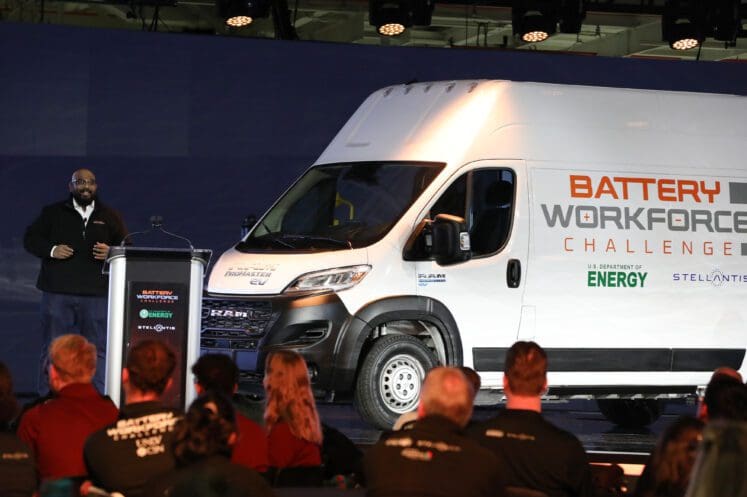
2022
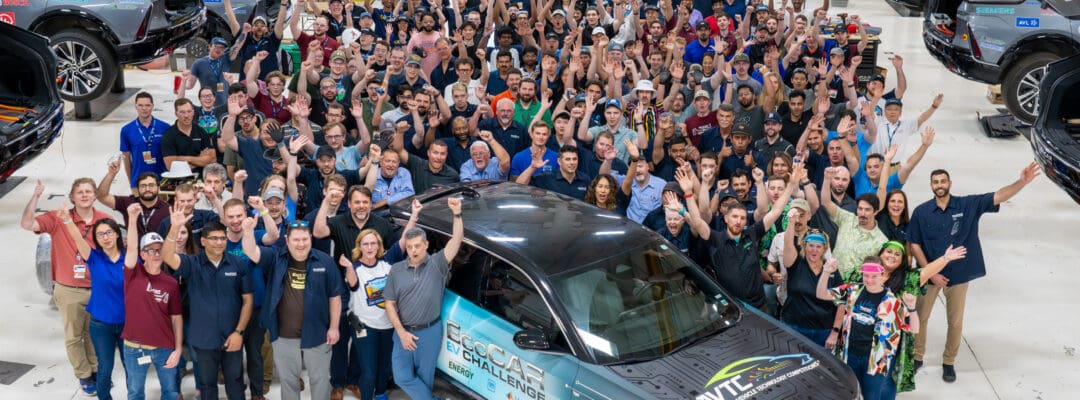
EcoCAR EV Challenge Begins
EcoCAR EV Challenge will challenge up to 15 North American universities to engineer a next generation battery electric vehicle (BEV) that utilizes automation and vehicle-to-everything (V2X) connectivity to implement advanced vehicle technologies and customer-pleasing features, while meeting the evolving needs of the automotive industry.
2018-2022
EcoCAR Mobility Challenge
The 11 EcoCAR schools have logged >10,000 test miles on their vehicles in Year 4.
By the numbers: A total of 2646 students have participated in the EcoCAR Mobility Challenge. EcoCAR students from more than 38 college majors have participated in the latest EcoCAR Mobility challenge. More than 200 companies have hired an EcoCAR student (either full time or for an internship)
2020
Human Machine Interface / User Experience added as a focus area of EcoCAR
The objective of the EcoCAR Mobility Challenge HMI/UX initiative is designed for teams to effectively educate a driver about their team vehicle’s Connected and Automated Vehicle (CAV) features such as adaptive cruise control (ACC), lane centering, and many more. EcoCAR prepares students to tackle the real-world problem of educating drivers about these new and ever-advancing features.
2019
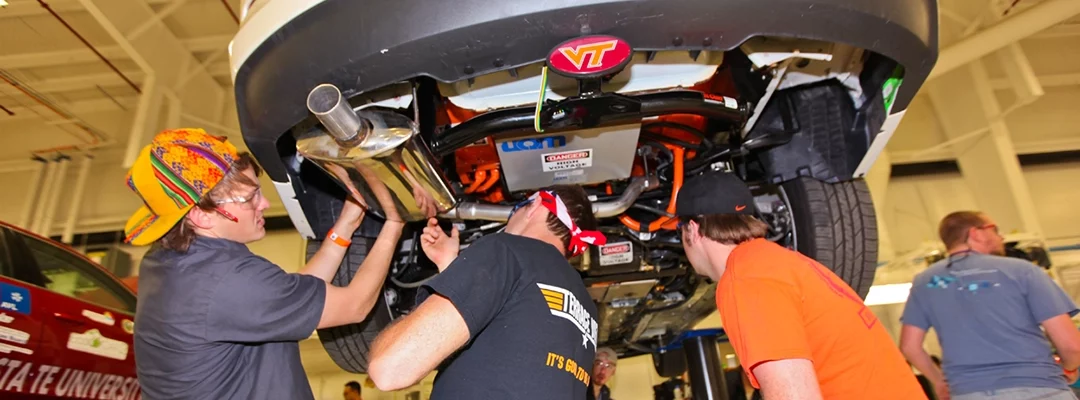
Implementing powertrain control based on perception system inputs
EcoCAR Mobility Challenge is the first AVTC where teams can implement powertrain control based on perception system inputs
2018
Celebrating 30 Years of AVTCs
Since 1988, the U.S. Department of Energy has sponsored Advanced Vehicle Technology Competitions (AVTCs) in partnership with the North American automotive industry. Managed by Argonne National Laboratory, AVTCs represent a unique coalition of government, industry and academic partners who join forces to execute North America’s premier collegiate automotive engineering competitions.
2014–2018
EcoCAR 3
EcoCAR 3 was the 11th U.S. Department of Energy (DOE) Advanced Vehicle Technology Competition (AVTC) series and is North America’s premier collegiate automotive engineering competition. The U.S. DOE and General Motors are challenged 16 North American universities to redesign a Chevrolet Camaro into a hybrid-electric car to reduce environmental impact, while maintaining the muscle and performance expected from this iconic American car.
2015
New Competition Feature: Advanced Driver Assistance System Applications
EcoCAR 3 teams began utilizing computer vision for Advanced Driver Assistance System Applicationss!
2015
2016 Chevrolet Camaro Donated to EcoCAR 3 Schools
General Motors donates a 2016 Chevrolet Camaro to each of the 16 EcoCAR 3 participating schools.
2014
New Competition Feature: Innovation becomes a new focus area in AVTCs
Teams develop unique innovation concepts for their EcoCAR 3 vehicle.
2013
Celebrating 25 Years of AVTCs
Since 1988, the U.S. Department of Energy has sponsored Advanced Vehicle Technology Competitions (AVTCs) in partnership with the North American automotive industry. Managed by Argonne National Laboratory, AVTCs represent a unique coalition of government, industry and academic partners who join forces to execute North America’s premier collegiate automotive engineering competitions.
2011–2014
EcoCAR 2: Plugging Into the Future
EcoCAR 2: Plugging In to the Future was a three-year collegiate advanced vehicle technology engineering competition established by the United States Department of Energy and General Motors (GM), and was managed by Argonne National Laboratory. The competition challenged 15 universities from across North America to reduce the environmental impact of the 2013 Chevrolet Malibu by improving its fuel efficiency and minimizing the vehicle’s emissions while retaining its performance and consumer appeal.
2012
New Competition Feature: Emissions Testing added to AVTCs
AVTCs added upstream criteria (CO, NOx, THC) emission testing into the scored deliverables, as well as measuring electric energy consumption during EcoCAR 2
2014
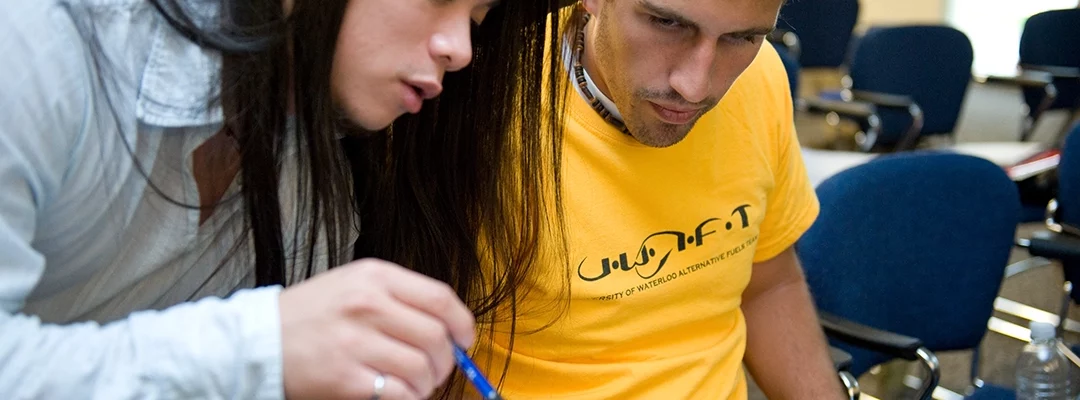
Testing Method Update
EcoCAR 2 implemented a 4-cycle drive cycle to reflect current test methods at the U.S. Environmental Protection Agency
2008–2011
EcoCAR: The NeXt Challenge
EcoCAR: The NeXt Challenge was a three-year collegiate advanced vehicle technology engineering competition established by the United States Department of Energy (DOE) and General Motors (GM), and was managed by Argonne National Laboratory.
2009
Implementing SAE J1711 Utility Factor (UF) standards
Emissions and energy consumption events using SAE J1711 Utility Factor (UF) standards were introduced
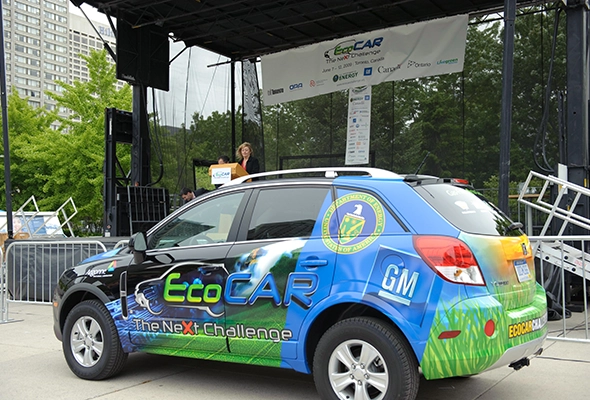
2008
Teams were introduced to prismatic energy storage systems for the first time
Teams were introduced to prismatic energy storage systems for the first time

2008
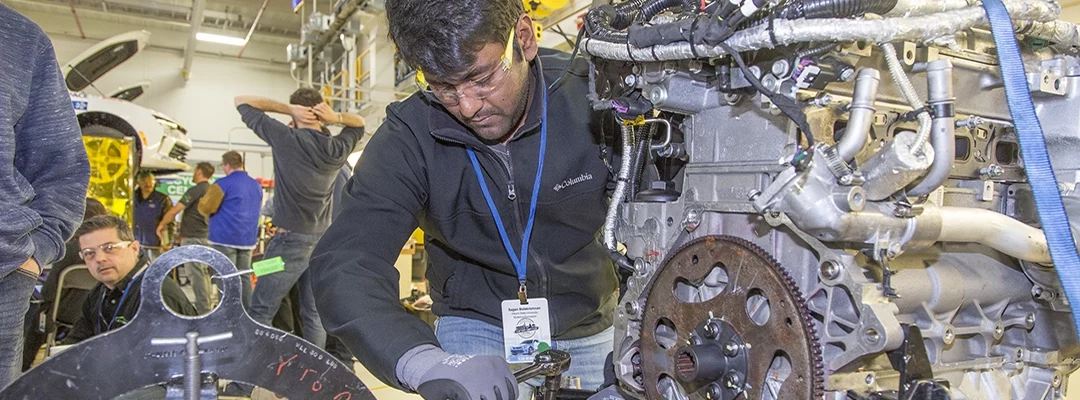
Hardware-in-the-Loop Activities introduced
EcoCAR: The NeXt Challenge marked the first time a hardware-in-the loop activity was introduced into an academic setting
2006
Fully functional fuel cell vehicle introduced
University of Waterloo competed successfully in every event as a fully functional fuel cell vehicle – a first for a fuel cell vehicle in AVTCs

2006
Outstanding Women in Engineering awards were introduced in AVTCS
These awards honor women from across many STEM disciplines who are demonstrating outstanding technical excellence both within their university academic programs, and most notably, through the AVTC program.
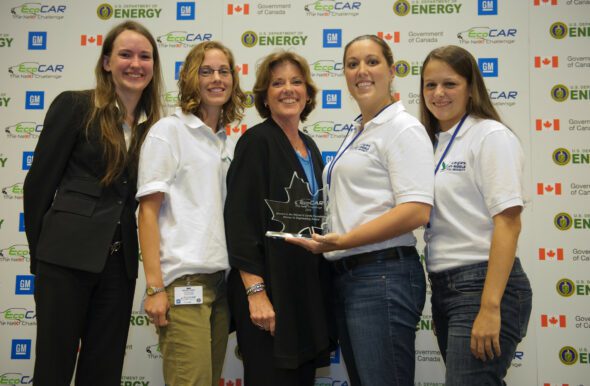
2004–2008
Challenge X: Cross to Sustainable Mobility
In the first decade of the new millennium, the American automotive customer market trended toward larger family-sized vehicles. At the same time, an increased need to reduce energy consumption, as well as decreased vehicle emissions, was becoming imperative. As a result, the automotive and electronics industries, the U.S. and Canadian governments, and the academic community worked together to launch Challenge X: Crossover to Sustainable Mobility.
2005
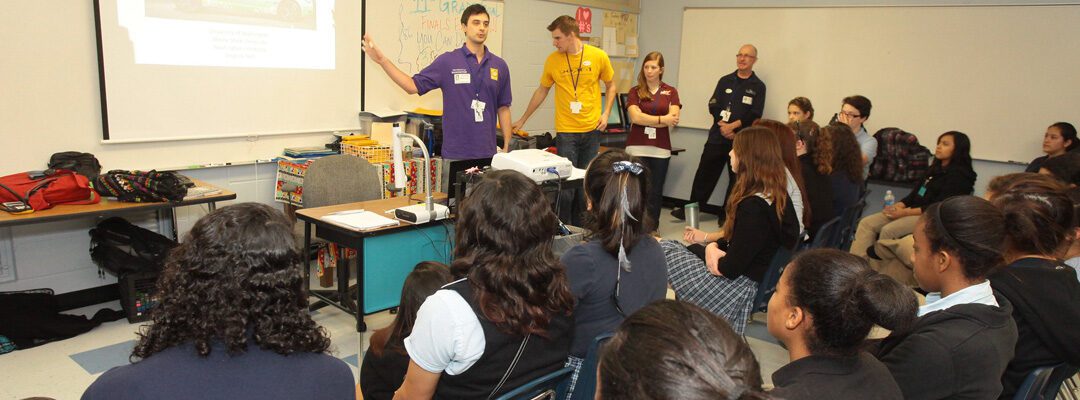
Introducing Communications & Outreach
The first scored communications/outreach program was introduced in AVTCs
2001
World’s first Tri-brid!
University of Idaho created the world’s first Tri-brid, combining hydraulic, ultracapacitors, and a combustion engine in one vehicle.

1999–2004
FutureTruck
In the early 2000s, the demand for light-duty trucks, sport utility vehicles (SUVs), and vans posed opportunities and challenges for the automotive industry. In response to this demand, General Motors and Ford Motor Company teamed up with the U.S. Department of Energy to create FutureTruck.
1998
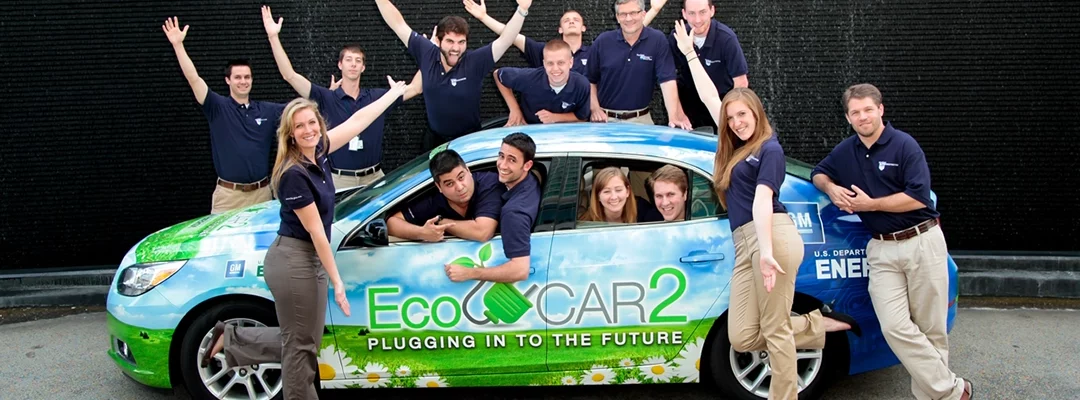
Introducing Advanced Vehicle Technology Competitions
The student competitions program officially becomes known as Advanced Vehicle Technology Competitions
1998
Fuel cell technology is introduced into the program
Fuel cell technology is introduced into the program

1997–2000
Ethanol Vehicle Challenge
The Ethanol Vehicle Challenge was developed to demonstrate the potential of ethanol to significantly lower emissions, improve performance, increase fuel efficiency, and improve cold starting of vehicles. During the three years of this Advanced Vehicle Technology Competition, the platform changed from a 5-passenger Chevrolet Malibu to a full-size Chevrolet Silverado to reflect consumer demands for larger vehicles and more power.

1997
Ethanol Vehicle Challenge marked the first time in AVTCs that teams were allowed to reconfigure and alter the vehicle’s powertrain control modules

1995–1999
FutureCar Challenge
FutureCar Challenge, conducted annually between 1995 and 1999, challenged North American universities to design and apply advanced technologies to mid-sized sedans. Parallel to the goals of the Partnership for a New Generation of Vehicles (PNGV), the FutureCar Advanced Vehicle Technology Competition (AVTC) series utilized advanced technologies and hybrid electric vehicle powertrains to achieve 80 miles per gallon, while offering the same comfort, safety, and affordability that consumers expected from conventional vehicles.
1995
Propane is introduced as an alternative fuel
Propane is introduced as an alternative fuel for AVTCs with Chrysler-donated Minivans for the Propane Vehicle Challenge

1995
Consumer acceptability was added into the competitions

1995
Largest fleet of hybrid electric vehicles in the United States
HEV Challenge marked the largest fleet of hybrid electric vehicles in the United States at that time, with a total of 51 vehicles
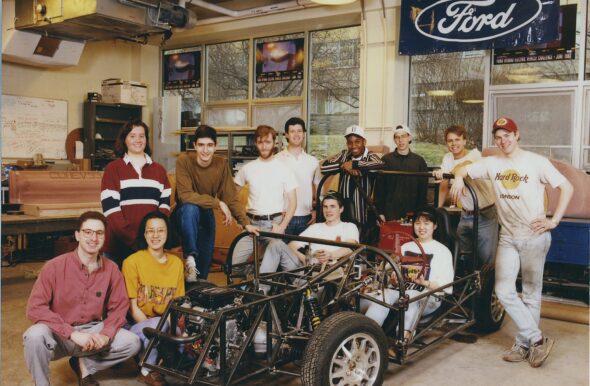
1995–1997
Propane Vehicle Challenge
The Propane Vehicle Challenge (PVC), held between 1995 and 1997, focused on converting 1996 Chrysler Minivans into dedicated propane vehicles, while maintaining the performance that consumers expected from gasoline vehicles.

1994
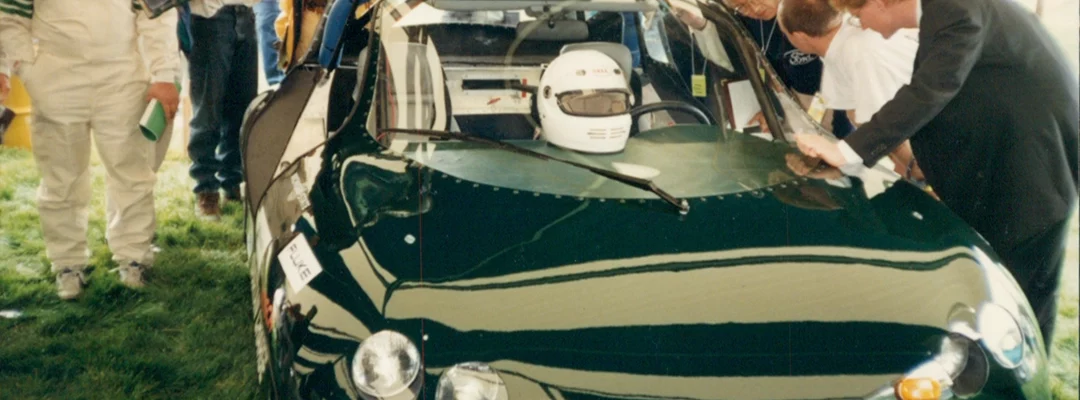
Hybrid electric vehicle Developed by the University of Maryland
The University of Maryland developed a hybrid electric vehicle similar to the Toyota Prius, which didn’t debut until 1996
1994
HEVs used to evaluate SAE draft HEV emissions test procedures for J1711
HEVs built by University of Illinois at Chicago, University of Maryland, and University of California-Davis were used to evaluate SAE draft HEV emissions test procedures for J1711

1993
UC-Davis successfully built the first plug-in hybrid electric vehicle in AVTC history

1993
Zero Emissions Vehicle (ZEV) Challenge
The competition added a mini-series, Zero Emissions Vehicle (ZEV) Challenge, to test the electric vehicle aspect of the ground up vehicles

1993
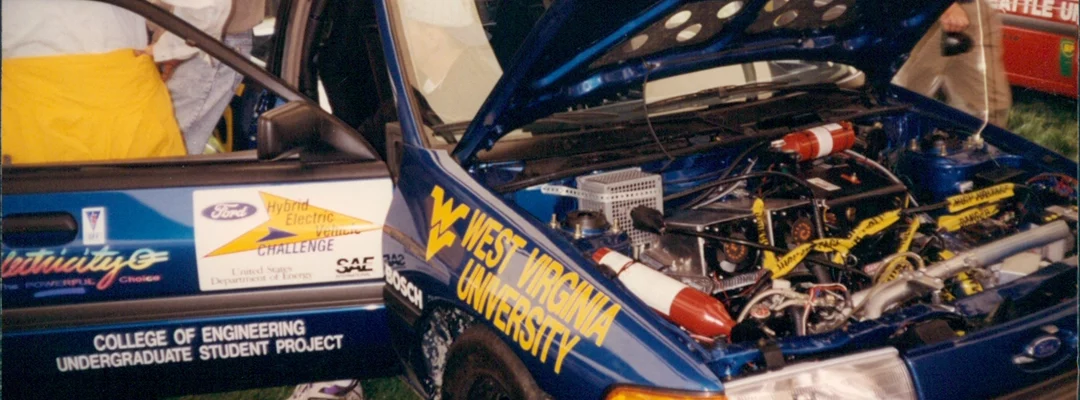
First ground-up vehicles were built during HEV Challenge
1993
Introducing dynamic events
AVTCs added dynamic events including ride and handling and engineering design review into competitions

1992–1995
HEV Challenge
The Hybrid Electric Vehicle (HEV) Challenge, conducted annually for three years, was an intercollegiate competition created by the U.S. Department of Energy (DOE) and the Society of Automotive Engineering (SAE). The HEV Challenge began with 18 Ford Escorts and 12 Ground-Up vehicles in 1993, 12 Saturn SL2 sedans were added in 1994, and 12 Dodge Neons were added in the 1995 HEV Challenge.
1992
Siemens Automotive implemented Old Dominion University’s design for a multi-alternative-fuel injector, which was used in Chrysler CNG vehicles

1990–1993
Natural Gas Vehicle Challenge
The Natural Gas Vehicle (NGV) Challenge began in 1991 when General Motors donated a GMC Sierra 2500 pickup truck to 24 engineering schools that submitted the best design proposals for the purpose of converting the vehicles to dedicated natural gas use. Natural gas was selected as the next fuel for the students to work with because the U.S. has an abundance of domestic natural gas resources and many natural gas companies were promoting its use in motor vehicles.
1989
First full emissions testing event at the U.S. Environmental Protection Agency in Ann Arbor, Michigan

1988–1990
Methanol Marathon
Methanol Marathon (1988-1989) was an alternative fuels competition for 15 colleges and universities in North America. Sponsored by the U.S. Department of Energy and General Motors Corporation, schools were selected based on the best proposals for converting 1988 Chevrolet Corsicas to operate on M85 (85% methanol, 15% hydrocarbons). General Motors provided kits of specialized parts to assist the schools with the conversion and teams were tasked to re-engineer these vehicles in under five months.
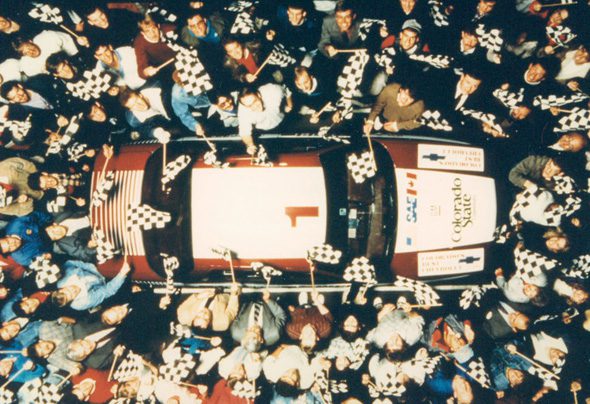
1988
AVTCs Begin
Methanol Marathon begins with converting 1988 Chevrolet Corsicas to operate on M85
1986
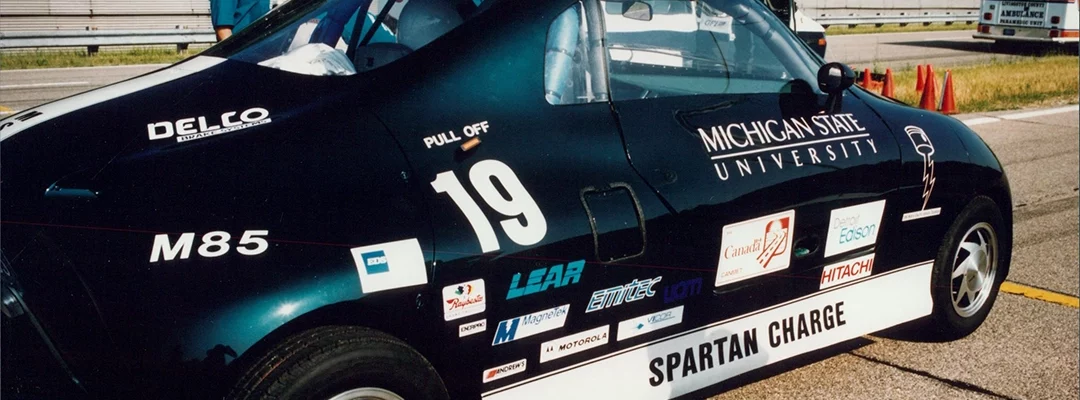
Conceptualizing AVTCs
In early 1986 Phil Patterson, a data analyst for the Vehicle Technologies Program (VTP) at DOE had an idea to start a program that would get university students involved in designing vehicles to run on alternatives to petroleum fuel. He enlisted the assistance of Bob Larsen at Argonne National Laboratory (ANL) to help come up with initial ideas. After discussions with SAE, ANL, and DOE, the concept for Advanced Vehicle Technology Competitions (AVTC) was formed.
